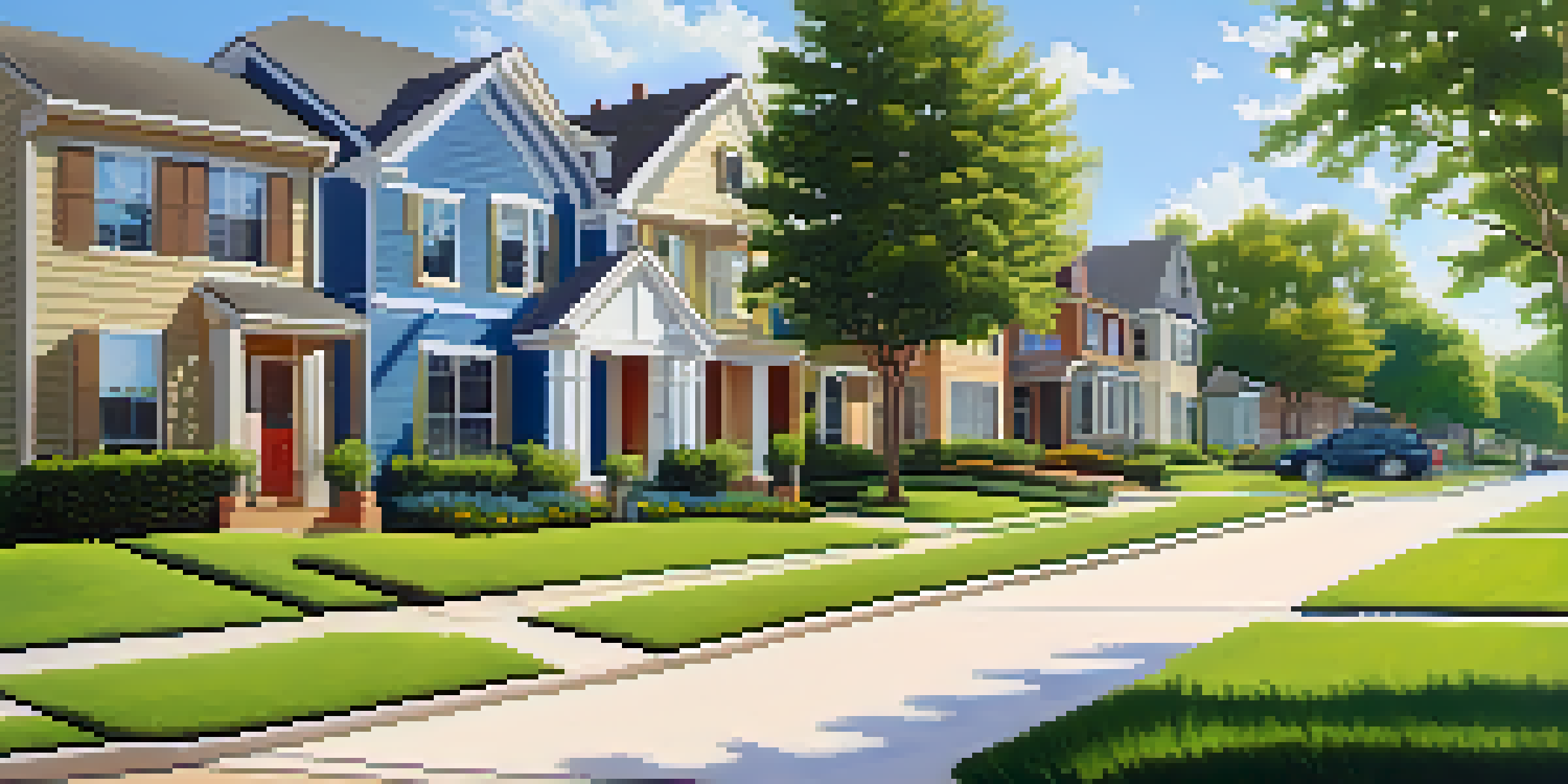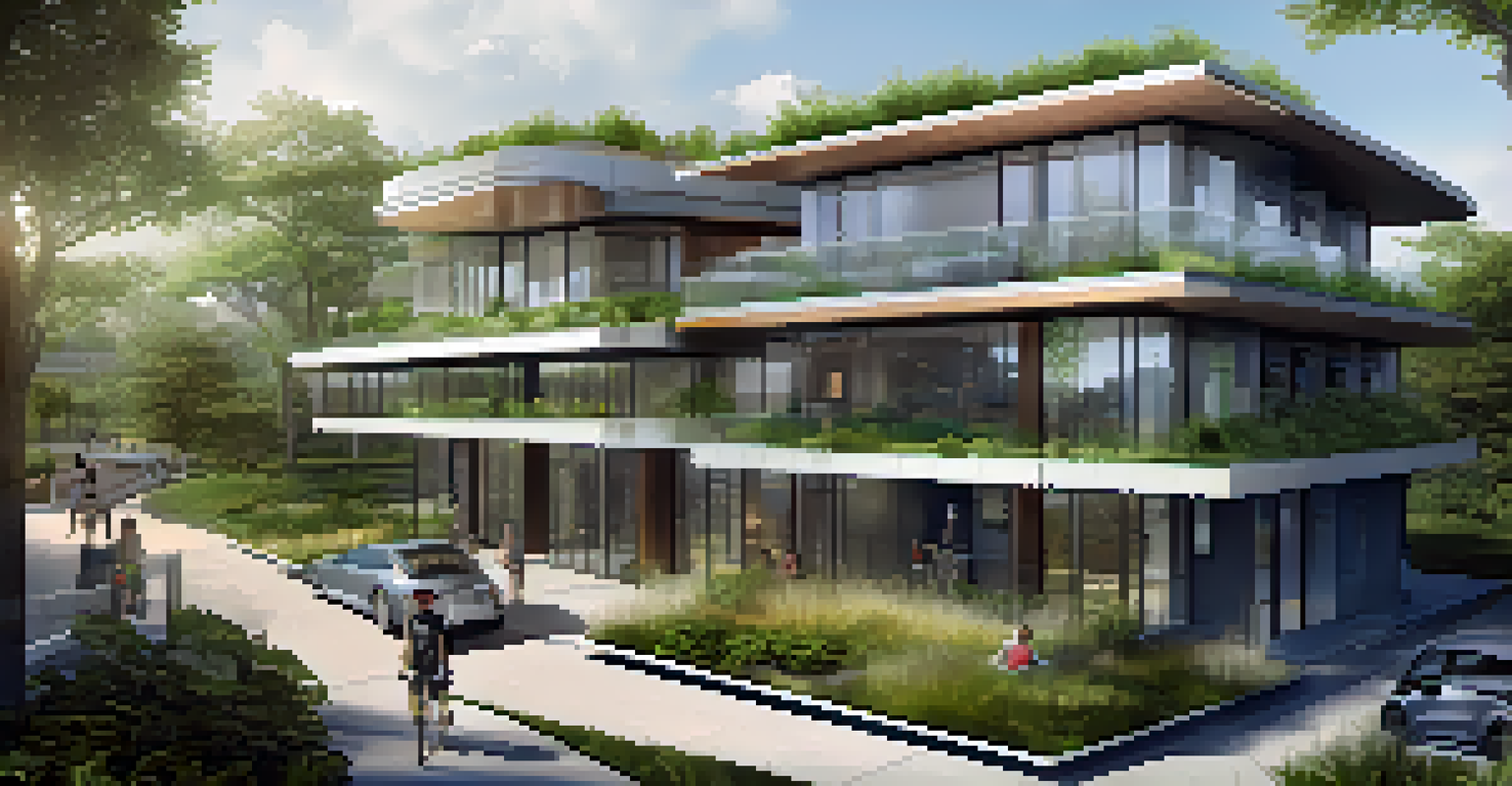Trends in Remote Work and Their Impact on Houston Real Estate

The Rise of Remote Work in Houston: A New Normal
Over the past few years, remote work has transitioned from a rare perk to a standard practice for many Houston companies. The COVID-19 pandemic acted as a catalyst, pushing businesses to adapt to this new way of working. Now, employees are enjoying the flexibility that comes with remote roles, leading to a significant shift in workplace culture. As a result, Houston's workforce is embracing this change, and it’s becoming a defining characteristic of modern employment.
The future of work is not about where you are, but about how you can achieve your goals from anywhere.
With companies like Chevron and NASA adopting hybrid models, Houston is witnessing a transformation in how people view their work-life balance. Many employees are no longer tethered to a single office, which opens up new possibilities for where they can live. This newfound freedom is prompting workers to reconsider their housing options, leading to a ripple effect in the local real estate market.
As remote work continues to solidify its position in Houston, it’s clear that the city is adapting to these trends. The ability to work from anywhere has made Houston a more attractive option for those seeking affordable living combined with career opportunities. This shift is not just a passing phase; it's reshaping the landscape of employment and housing in the area.
Changing Preferences: Urban vs. Suburban Living
As more employees work remotely, many are reevaluating their living situations. In the past, urban centers like downtown Houston were hot spots for young professionals. However, with the flexibility to work from home, there’s a noticeable trend towards suburban living, where spacious homes and quieter neighborhoods are appealing to families and remote workers alike.

Suburban areas like Katy and The Woodlands are seeing an influx of demand as people prioritize larger living spaces and outdoor amenities. These neighborhoods offer not just homes but a lifestyle that aligns with remote work’s flexibility. As a result, home prices in these areas are on the rise, while urban properties may face a slower pace of sales due to changing preferences.
Remote Work Reshapes Housing Demand
As remote work becomes standard in Houston, many employees are shifting from urban to suburban living for more space and amenities.
This shift also highlights the importance of community and local amenities. Families are looking for neighborhoods that provide parks, schools, and recreational facilities, making suburban areas increasingly attractive. The battle between urban convenience and suburban tranquility is redefining what it means to find the perfect home in Houston.
The Impact on Commercial Real Estate in Houston
The rise of remote work is not just affecting residential real estate; it’s also shaking up the commercial property market in Houston. With many businesses downsizing or rethinking their office space needs, there’s been a notable decrease in demand for traditional office buildings. Companies are opting for flexible workspaces or co-working environments that cater to a hybrid workforce.
Remote work is not just a trend; it's a shift in how we think about where and how we work.
This shift has led to an increase in vacant office spaces in downtown Houston, raising questions about future use. Some landlords are exploring creative solutions, such as converting office buildings into residential units or mixed-use spaces. This trend not only addresses the surplus of commercial real estate but also aligns with the city’s broader push for urban revitalization.
Additionally, as businesses adapt to remote work, they’re investing more in technology and infrastructure that support virtual collaboration. This pivot means that future commercial developments may focus more on tech-enabled spaces rather than traditional layouts. The commercial landscape in Houston is evolving, and so are the opportunities for investors and developers.
Technology's Role in Facilitating Remote Work
Technology has been a game changer in enabling remote work, and its impact on Houston real estate is significant. From video conferencing tools to cloud-based collaboration platforms, these advancements allow teams to connect seamlessly, regardless of location. As businesses invest in these technologies, the demand for homes equipped with robust internet connectivity is on the rise.
Real estate agents are increasingly highlighting tech-friendly features in homes, such as high-speed internet and dedicated home office spaces. This focus on technology is appealing to remote workers who prioritize a conducive work environment. As a result, homes that cater to these needs are becoming more valuable in the market.
Commercial Real Estate Evolution
The rise of remote work is leading to a decline in traditional office space demand, prompting creative adaptations in Houston's commercial real estate market.
Moreover, as technology continues to evolve, so too will the expectations of remote workers. Future developments may include smart home features that enhance productivity, making technology a crucial factor in real estate decisions. The intertwining of tech and real estate is reshaping the way people think about their living spaces in Houston.
Affordable Housing: A Growing Concern
As demand for suburban living increases, so does the concern over affordable housing in Houston. While many families are seeking larger homes, the rising prices in these desirable areas can be prohibitive. This is particularly challenging for first-time homebuyers, who may find themselves priced out of the market as competition heats up.
Local government and organizations are taking notice of this trend and are beginning to address the need for affordable housing options. Initiatives are being developed to promote sustainable growth and ensure that diverse income levels can access housing. By focusing on inclusivity, Houston aims to maintain its vibrant community while accommodating the influx of remote workers.
The challenge lies in balancing growth with affordability, ensuring that as the city evolves, it doesn’t leave behind those who helped shape it. As remote work continues to influence housing markets, the conversation around affordable housing will remain a critical topic for Houston’s future.
Environmental Considerations in New Developments
With the shift towards remote work, there’s also a growing awareness of the environmental impact of housing and development in Houston. Many homebuyers are now considering eco-friendly features as a priority, pushing builders to incorporate sustainable practices into their designs. This trend aligns with a broader movement towards climate-conscious living.
Developers are responding by creating energy-efficient homes that utilize renewable resources and minimize waste. Features like solar panels, green roofs, and smart home technologies are becoming more common. This not only attracts environmentally conscious buyers but also contributes to long-term savings on utility bills.
Focus on Affordable Housing Solutions
With increasing suburban demand, Houston faces challenges in maintaining affordable housing options for a diverse population.
As Houston continues to grow, the focus on sustainability will likely influence future real estate developments. The city has the opportunity to lead in creating environmentally friendly communities that cater to the needs of modern remote workers while preserving natural resources for future generations.
Future Outlook: What’s Next for Houston Real Estate?
As remote work solidifies its place in the fabric of Houston's economy, the real estate market is poised for continued transformation. The ongoing demand for flexible living arrangements and amenities that support remote work will shape future developments. Builders and investors who recognize and adapt to these trends will likely thrive in this evolving landscape.
The integration of technology, sustainability, and community-focused designs will play a pivotal role in attracting buyers. As the market shifts, understanding these preferences will be crucial for real estate professionals. Keeping a pulse on what remote workers value will help guide decision-making for future projects.

Ultimately, the future of Houston real estate will hinge on its ability to adapt to changing lifestyle preferences. As remote work becomes a permanent feature of employment, the city has the opportunity to create a vibrant, inclusive, and sustainable community that meets the needs of its residents.